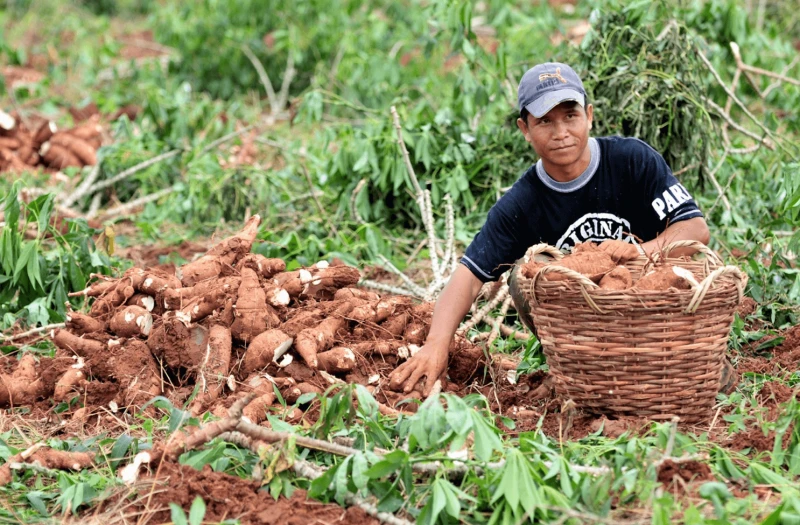Pesticide-free crop protection yields sizable economic benefits in Asia-Pacific
Pesticide-free crop protection yields sizable economic benefits in Asia-Pacific


The study, led by Dr. Kris Wyckhuys with contributions on the data collection from Dr. Matthew Cock and Dr. Frances Williams of the Center for Agriculture and Bioscience International (CABI), unveils the magnitude and macro-economic relevance of biodiversity-based contributions to productivity growth in non-rice crops over a 100-year period between 1918 and 2018.
Scientifically-guided biological control of 43 exotic invertebrate pests allowed for between 73 percent to 100 percent yield loss recovery in critical food, feed and fiber crops including banana, breadfruit, cassava and coconut.
“The Green Revolution is credited with alleviating famine, mitigating poverty and driving aggregate economic growth since the 1960s — enabled through a tripling of rice output. Cornerstone of the Green Revolution were the ‘packaged’ seed x agro-chemical technologies and biological innovations such as high-yielding, disease-resistant cereal varieties,” said Wyckhuys, who is affiliated with academic institutions in China, Vietnam and Australia.
“Our research is the first to gauge the financial benefit of using biological control to fight crop pests in the Asia-Pacific region and demonstrates how these ecologically-based approaches promoted rural growth and prosperity in marginal, poorly-endowed, non-rice environments,” Wyckhuys continued.
“By thus placing agro-ecological innovations on equal footing with input-intensive measures, our work provides lessons for future efforts to mitigate invasive species, restore ecological resilience and sustainably raise output of global agri-food systems,” Wyckhuys said.
The scientists, who show how 75 different biological control agents mitigated 43 pests over a 100-year range, outline how biodiversity-driven ecosystem services underpin food systems and societal wellbeing in the face of environmental change.
“Biological control delivered durable pest control in myriad Asia-Pacific agriculture sectors, permitting yield-loss recoveries up to 73 percent, 81 percent and 100 percent in cassava, banana and coconut crops respectively,” added co-author Dr. Michael Furlong of the University of Queensland in Australia.
“The ensuing economic dividends are substantial, as pest-induced losses up to US$6.8, $4.3 and $8.2 billion annually for the above crops were offset (at respective values of $5.4-6.8 billion, $1.4-2.2 billion and $3.8-5.5 billion/year, for a conservative to high impact scenario range). As many of the underlying programs were run on a shoestring, the rate of return on biological control science is extraordinary,” Furlong continued.
“Our work constitutes an empirical demonstration of how insect biological control helped solidify the agrarian foundation of several Asia-Pacific economies and in doing so, places biological control on an equal footing with other biological innovations, such as Green Revolution germplasm.
“Not only does it spotlight its transformative impacts — especially in light of increasing global reliance on chemical pesticides — but it also celebrates the century-long achievements of dedicated, yet often, un-acclaimed insect explorers and biological control pioneers,” he noted.
This article originally ran at the Cornell Alliance for Science and has been republished here with permission.Follow the Alliance for Science on Twitter @ScienceAlly

 | Videos | More... |

Video: Nuclear energy will destroy us? Global warming is an existential threat? Chemicals are massacring bees? Donate to the Green Industrial Complex!
 | Bees & Pollinators | More... |

GLP podcast: Science journalism is a mess. Here’s how to fix it

Mosquito massacre: Can we safely tackle malaria with a CRISPR gene drive?

Are we facing an ‘Insect Apocalypse’ caused by ‘intensive, industrial’ farming and agricultural chemicals? The media say yes; Science says ‘no’
 | Infographics | More... |

Infographic: Global regulatory and health research agencies on whether glyphosate causes cancer
 | GMO FAQs | More... |

Why is there controversy over GMO foods but not GMO drugs?

How are GMOs labeled around the world?

How does genetic engineering differ from conventional breeding?
 | GLP Profiles | More... |

Alex Jones: Right-wing conspiracy theorist stokes fear of GMOs, pesticides to sell ‘health supplements’




 California, Washington, Oregon forge immunization alliance to safeguard vaccine access against federal undermining
California, Washington, Oregon forge immunization alliance to safeguard vaccine access against federal undermining Trust issues: What happens when therapists use ChatGPT?
Trust issues: What happens when therapists use ChatGPT? Fighting deforestation with CO2: Biotechnology breakthrough creates sustainable palm oil alternative for cosmetics
Fighting deforestation with CO2: Biotechnology breakthrough creates sustainable palm oil alternative for cosmetics Viewpoint — Fact checking MAHA mythmakers: How wellness influencers and RFK, Jr. undermine American science and health
Viewpoint — Fact checking MAHA mythmakers: How wellness influencers and RFK, Jr. undermine American science and health 30-year-old tomato line shows genetic resistance to devastating virus
30-year-old tomato line shows genetic resistance to devastating virus The free-range chicken dilemma: Better for birds, but with substantial costs
The free-range chicken dilemma: Better for birds, but with substantial costs Viewpoint: Video — Big Solar is gobbling up productive agricultural land and hurting farmers yet providing little energy or sustainabilty gains
Viewpoint: Video — Big Solar is gobbling up productive agricultural land and hurting farmers yet providing little energy or sustainabilty gains ‘You have to treat the brain first’:Rethinking chronic pain with Sanjay Gupta
‘You have to treat the brain first’:Rethinking chronic pain with Sanjay Gupta
